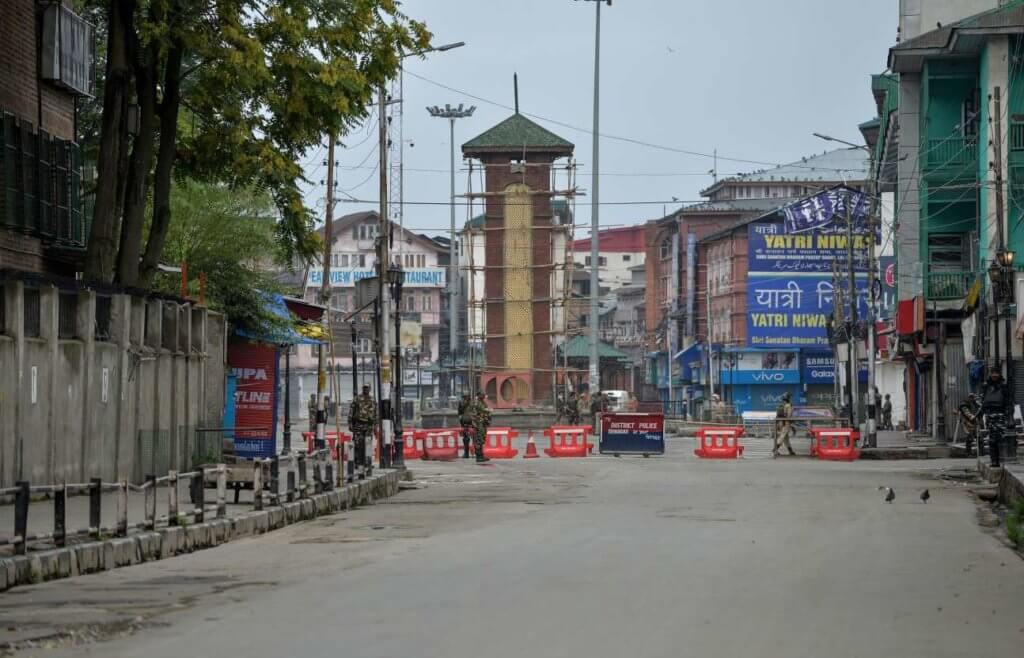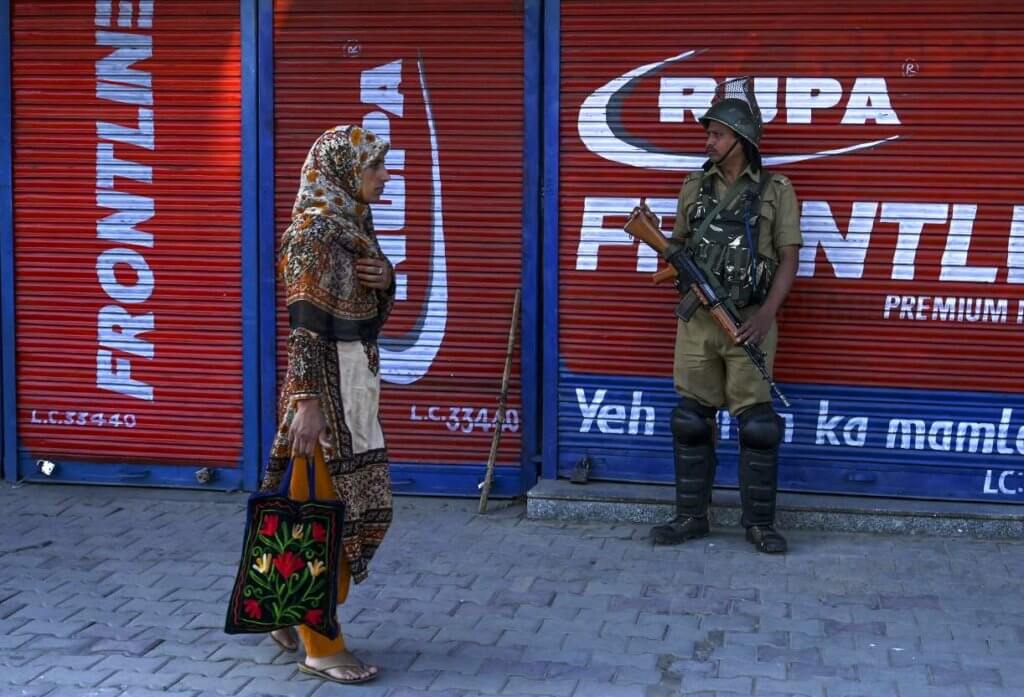August 5 marked one year of military lockdown for the people in Indian-occupied Kashmir.
Kashmir, like Palestine, is a disputed territory.
On August 5, 2019, the Kashmiri people lost their autonomous status, when the government of India arbitrarily revoked Article 370 and 35A of the Indian constitution and suspended the Jammu and Kashmir constitution.
The people of Kashmir were promised a plebiscite to determine their own future in UN Security Council Resolution 47 in 1948.
Article 370 of the Indian Constitution had provided special status for Jammu and Kashmir, while the people waited for this plebiscite promised by the international community.

The revocation of Article 35A opened the floodgates for an Israeli-style colonial settlements in the occupied area. This provision had provided local protection since 1927, prohibiting those who are not “permanent residents” of Jammu and Kashmir from building settlements.
Kashmir is the most militarized place on earth, with a reported one million Indian forces and a population of eight million Kashmiris.
The tactics of the Indian military, parallel those of the Israeli military. Detention without charge, under the Public Safety Act, in Kashmir, is used in the same way as administrative detention is used in Israel. In contravention of the Fourth Geneva Convention prisoners are taken from the occupied area. In the case of Kashmir, the ICRC stopped providing prisoner liaison services after the Indian government stopped renewing ICRC staff visas last August. Thus, unlike Palestine, the people of Kashmir do not necessarily know where their family members are being held, and can not arrange for communication or visits.
In December 2019, we were part of a human rights delegation to Azad Jammu Kashmir, the region of Kashmir administered by Pakistan. We met with people exiled from Kashmir in the early 1990s, still living in makeshift camps. The last of three waves since 1948, they had too fled after arbitrary arrests, homes being burned, and genocide. We were struck by the similarity of the Palestinian Nakba and Naksa.
Shockingly, the people in AJK told us that we were the first visit from the international community. Compared to the many NGOs and activists that visit Palestinian refugee camps, the lack of attention on the people of Kashmir was striking.
The message from Kashmiris in AJK was clear — they want to return to their own land in Kashmir, and they want freedom through the right to self-determination to be realized through the plebiscite promised by the United Nations in 1948, just as the people of Palestine wait for the realization of United Nations Resolution 194 promised to them by the international community as well in 1948.
Over the last year, behind the veil of blocked communications, and with the world focused on its own challenges associated with COVID-19, India has swiftly and deliberately moved forward its settler-colonial project.
Internet and telephone were shut down on August 4, 2019, and only was 2G and minimal 4G being opened up again as COVID-19 struck. This was short lived, with a reversion to 2G and a number of internet blockages being put back in place in March onwards.
Time was not lost after August 5 in moving ahead the colonial settlement project. By October, the Indian Forest Advisory Committee gave clearances in occupied Kashmir to 198 projects that involved the diversion of forest land for power projects, building roads and military use.
Then on March 31, 2020, the Domicile law was put in place, with grave implications. It allows non-Kashmiris to buy property and settle in the state.
Laws and rules were changed, and procedures were put in place to immediately allow for this settlement to get underway. Just like the Jewish-only Israeli settlements in the West Bank, the Hindu-only Indian settlement in Kashmir, was underway.
Like Palestinians living under occupation, the indigenous Kashmiri population now have to apply for residency permits to carry on basic functions of life.
These actions are prohibited by Article 49 of the Fourth Geneva Convention. Article 49 states “the occupying power shall not transfer its own civilian population into territory it occupies.”
Kashmir and Palestine are both a result of unfinished business left at the end of the British colonial project. Both are a result of decolonization not being afforded to the indigenous population. In 1948, key resolutions were passed for both the people of Kashmir and Palestine. It looked like the international community was ready to address its colonial leftovers with expediency and with just solutions.
Just as the “Israel-Palestinian conflict” label obfuscates a 72-year occupation by suggesting the conflict is somehow between two equal parties, the hindutva project labels Kashmir as “an internal bilateral issue.” Both discourses ignore that these are military occupation by settler-colonial state projects complete with apartheid and war crimes.
Just as Palestine is not a conflict, it is settler colonization, apartheid, and a military occupation, so too is Kashmir, not a bilateral issue. Kashmir is an issue of self-determination, a promise made by the international community that has not been fulfilled.
Our complicit silence over the last 72 years has led to a settler-colonization project on steroids for the people of Kashmir just as in Palestine. It is time for the international community to remember the promises of 1948—right of return, and self-determination.



“The tactics of the Indian military, parallel those of the Israeli military. “
Why the comma?
A lot of valid facts, but a salient difference is that Kashmiris in Indian administered Kashmir are Indian citizens, with the right to vote and to settle and move throughout India (ditto for Kashmiris in Pakistani administered Kashmir). They may not want that (or some of them may?), but they have not been made stateless people. The author may also not be aware that the UN resolution applies to the whole of the former princely state of Jammu and Kashmir – which includes the Kashmir valley (Indian and Pakistani) but also (ethnically and religiously distinct) Ladakh and Jammu (Indian side of the border) and Baltistan and the Northern Areas (Pakistani side, also different from Kashmir proper). The changes in Indian law re buying property are likely to be felt in Jammu and Ladakh rather than the Kashmir valley itself – which remains too dangerous for non-Kashmiris (or even Hindu Kashmiris, 10% of the indigenous population of the valley who are now overwhelmingly IDPs) to live in. Not to dispute what the author has said, but only to add some meaningful information. Basically: not really like Palestine. Indian (not Kashmiri) Muslim here, and I think we have lost significantly in the valley because of how we’ve gone about things, but fwiw.
Infornation about the situation in Kashmir is hidden from Indians through an incredible amount of propaganda, while simultaneously using the Kashmir inhabitant or the Muslim as a hostage/target practice for Hindutva’s pyschological dysfunction/similar to Zionism.
So Kashmir is not just locked down but locked out. Articles like this are few and hope the coverage on Kashmir continues to increase so the world knows about this injustice.